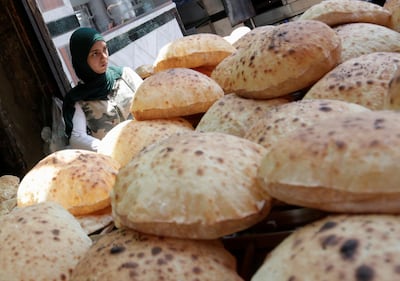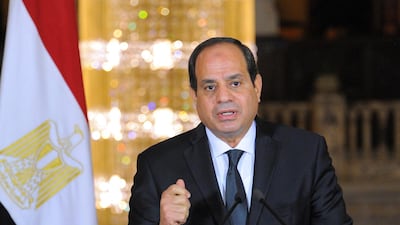Egyptian President Abdel Fattah El Sisi has made his case for increasing the price of bread, but says he has no intention of completely lifting the subsidies that keep basic food items affordable for about 70 million people.
Mr El Sisi first spoke about raising the price of bread on August 3, but he did not specify the extent of the planned increase.
His comments sparked debate on social media and in parts of the pro-government press about whether such a move was necessary given the economic hardship already endured by the country’s poor majority.
The price of bread has been a politically sensitive issue in Egypt for the past 50 years. Governments have made keeping the price low through costly subsidies – a flat loaf costs 0.05 Egyptian pounds ($0.0032) – a pillar of socio-economic policy.

A plan to lift bread subsidies in 1977 sparked days of deadly riots across the country. Successive governments have since found other ways to reduce the bread subsidies bill, such as reducing size of the loaf or suspending ration cards if their holders were found to be making enough money.
“Don’t be worried, we will not remove subsidies altogether, but will instead reorganise it,” Mr El Sisi said on Saturday during the inauguration of a housing project to the east of Cairo.
“I must reorganise the affairs of the country so it can be a nation of some weight.
“I take the difficult path, not the easy one … some people say to me, ‘You’re doing fine and people love you, so why do this?' I say we are doing this to change our country, not so that people love us.”
Egypt spends about 275 billion pounds a year (roughly $15bn) on subsidies. About 70 billion pounds ($4.5bn) goes to bread alone, with each eligible person entitled to five flat loaves a day.
Meeting the demand for bread has made Egypt the world’s largest wheat importer, annually topping up its wheat production of nine million tonnes by importing about 12 million tonnes.
Mr El Sisi said subsidies amounted to about three trillion pounds over 10 years, while a three-year programme to improve the quality of life for about 50 million people in rural areas cost 800 billion pounds.
Since 2016, Mr El Sisi has introduced far-reaching reforms to overhaul the economy, battered by years of turmoil after a 2011 uprising.
The reforms include a partial lifting of subsidies on a variety of goods and services, including fuel, electricity and drinking water. New taxes have been introduced and the pound devalued.
The measures were praised by donors and international financial agencies, but added significantly to the hardships faced by many Egyptians. There have been protests against price increases.
The government, meanwhile, has gone to some lengths to cushion the poorest Egyptians from price increases triggered by the reforms.
It has also spent billions to tackle the shortage of cheap housing, building hundreds of thousands of apartments, including units given to residents of shanty towns demolished by authorities.
"In order to continue [doing this], we need to rearrange and recast the subsidies that we provide people with," Mr El Sisi said.
"I would rather we ate less but lived in decent housing units that meet minimum needs.
“I have spent 50 years studying all this and wonder to myself, 'How did the country get to be like that?' And [I think] that it must change and its people must live as they should.”


